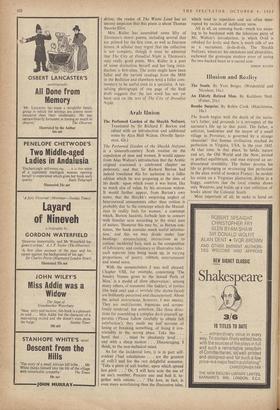Illusion and Reality
An Elderly Retired Man. By Kathleen Nott. (Faber, 21s.) The South begins with the death of the narra- tor's father, and proceeds to a retrospect of the narrator's life up to that point. The father, a solicitor, landowner and the mayor of a small village in Provence, is governed by a strange obsession : that human civilisation reached its perfection in Virginia, USA, in the year 1842. At that time, in that place, he holds, nature and art, the Old World and the New, existed in perfect equilibrium, and man enjoyed an un- dissociated sensibility. The father devotes his life to prolonging or re-creating that perfection in the alien world of modern France : he models his estate on a Virginian plantation, drives in a buggy, contrives that the local cinema shows only Westerns, and builds up a vast collection of books about the Colonial South.
Most important of all, he seeks to hand on his obsession to his son and daughter. With the former he is successful. The narrator de- scribes his precocious enthusiasm for early American travel books and Indian grammars, and the nocturnal buggy .rides on which he and his father were able to imagine themselves back in legendary Virginia. His sister, however, defies the myth to which she owes her name —Virginie. At the first opportunity she leaves home to pursue her studies and a casual bohemian life in the university town of Mont- pellier. And when the narrator joins her to attend the lycee, she mounts an elaborate cam- paign to free him from his father's spell. She becomes his mistress, urging him to the limits of sexual indulgence; and she encourages him to write a book in which he will rid himself of the Virginian myth by exposing it and by celebrating the here and now. 'You must write in short sentences,' she tells him. But gradually we realise that the book he is writing is the book we are reading, that it is written in long ten- tacular sentences, and that what it celebrates is his father and his father's obsession. When Virginie discovers this, the incestuous love affair comes to an abrupt conclusion, and the narra- tor returns home to find that his father has been killed in an accident. But his spirit remains powerful.
The remote ancestor of The South—as of so many novels—is Don Quixote: both books are concerned with a conflict between ,illusion and reality in characters governed by an anachronis- tic obsession. But The South is a characteristic product of the modern literary sensibility in that the conflict is treated tragically rather than comically, reality is represented by perverse sexuality, and illusion is triumphant at the end. Within these rather oppressive limits, The South is a remarkable achievement. Although Mr. Robert Baldick seems to have done a very good translation, the novel is probably even more impressive in the original, since it is subtly and intelligently concerned with the nature of lan- guage itself. The fact that M. Berger was awarded the Prix Femina for this, his first novel, restores one's faith in continental book prizes.
Miss Non's central character is another man whose illusions are challenged—and in this case shattered—by passionate sexual experience. But An Elderly Retired Man is characteristically English in its fidelity to the texture of social environment, and belongs to a well-established tradition of Anglo-American fiction—James, Forster, Angus Wilson—discussed by Mr. C. B. Cox in his recent book The Free Spirit. I mean that it is concerned with the viability of liberal humanism as a code of living. Miss Nott is not the first to reach a negative conclusion; but she gives us so little to admire in her hero that her theme loses much of the interest it might have had. The novel is made up of the journal of Sidney Roden Cluer after his retirement from the Civil Service. We soon gather that all his life he has participated energetically in every kind of liberal cause, sedulously cultivated personal relationships and carried, rather ostentatiously, the cross of marriage to a neurotic wife. We also realise that he is smug and self-indulgent. The crunch comes' when, looking for a house in Sicily, he falls passionately in love with a woman who lives by a kind of Laurentian obedience to instinct and impulse. The effort of readjusting his values so late in life proves too taxing for Cluer. This climax, though too long delayed, is well handled, and lifts the novel to a precarious success.
Finally, a runner in the autumn satire stakes. Bombe Surprise, after a jaded opening in the aimless-young-man-in-a-Chelsea-bed-sitter style, rapidly transforms itself into a lively and inventive fantasy about a British Fascist Party which nearly succeeds in carrying off a coup d'etat. This conceit is too wildly improbable to carry much satiric sting, but Mr. Cook whips his characters through their hoops so fast that one scarcely minds. He is not a wit, but he is a gifted manipulator of comic situations, creating a world of cruel anarchic farce which occa- sionally reminds one of vintage Waugh.
DAVID LODGE











































 Previous page
Previous page